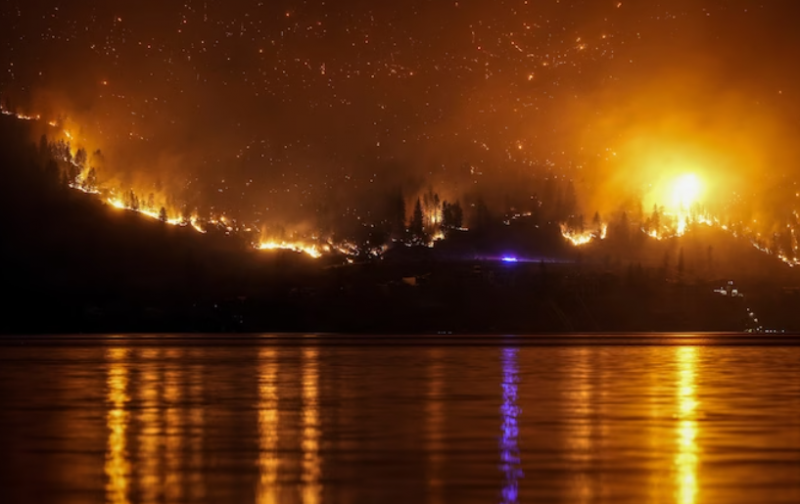The Canadian province of British Columbia boasts its Latin motto (Splendor sine occasu), meaning "Greatness never fades," derived from the notion that the British colony "never saw the sunset on the Roman Empire." Located on the Pacific Ocean, bordering Alaska, Alberta, and the United States, its climate varies due to topographical diversity, with warm westerly winds contributing to mild winters and warm summers, characterized by abundant coniferous forests.
However, this presentation of the province, which has lasted for thousands of years, has been altered by recent fires impacting both its landmarks and mountainous terrains. Due to climate change, the region has witnessed the worst natural disaster in urban history, with daylight transforming into shades of blood-red or yellow. Evacuation orders varied from immediate evacuations of cities to preparedness for potential evacuations. The losses were not limited to the residents of British Columbia; the scene was horrifying due to the number of animals that were burned and reduced to ash scattered by the winds. The number of active fires surpassed 380, some out of control.
The province declared a state of emergency, recognizing it as the worst wildfire season in modern Canadian history, as described by the Washington Post. Officials expanded evacuation notices to include Kelowna, a city with around 150,000 residents, particularly in the western areas where flames approached homes and forests. Across the border into Spokane County, Washington, approximately 240 miles south, residents were issued immediate evacuation orders, classified as level three—meaning "Go, leave now!" According to the provincial emergency management office, the evacuation order remained in effect after a fire caused power outages and destroyed more than 185 structures. The Washington State Department of Natural Resources reported fatalities due to the fire.
**Official Position**
British Columbia's Premier David Eby announced in a press conference that this wildfire season is the "worst" in the province's history, assuring residents, "There should be no complacency regarding immediate evacuation decisions as fires move faster than people." He added, "The situation is currently unpredictable, and there are certainly difficult days ahead." Provincial Emergency Management Minister Bowinn Ma stated that at least 15,000 people were ordered to evacuate, with approximately 20,000 more on alert—requested to prepare to leave.
Authorities urged people to avoid non-essential travel to partially affected areas to keep roads clear for firefighters and responders. Emergency services warned that winds could "exacerbate wildfires and potentially ignite new ones." Images showed flames on hillsides near Okanagan Lake, and according to Canadian Public Radio, the fires consumed a resort near the lake.
The West Kelowna Fire Department summarized the area's condition as follows: "We experienced fires sufficient for a century in one night." The flames threatening Kelowna and West Kelowna are among the 380 massive fires burning in British Columbia, according to the province's wildfire service. Dozens of fires have been classified as "out of control."
**Evacuations**
Warnings were issued in British Columbia after residents of Yellowknife, located farthest north, were evacuated by land and air under an evacuation order for the entire capital of Canada’s Northwest Territories—over 20,000 people—due to fears of a massive fire near the city. Officials stated that nearly all Yellowknife residents had left and urged the remaining individuals to escape to safety.
In a summer that has seen record temperatures globally, elevated heat exacerbated by climate change, alongside current dry conditions, has intensified the wildfire season in Canada this year. Hundreds of fires across Canada have burned double the area of the country compared to any previous season—an area equivalent to the size of Alabama.
**Trudeau**
Canadian Prime Minister Justin Trudeau commented during a meeting with evacuees from Edmonton and Alberta, where the exhibition center is hosting people fleeing from the Northwest Territories, that Canadians have supported each other during what "has been an incredibly tough summer for people across this country." He stated, "Despite the wildfires across the country, the significant losses, and the increasing frequency of extreme weather events, we have witnessed Canadians united to confront the disaster."




